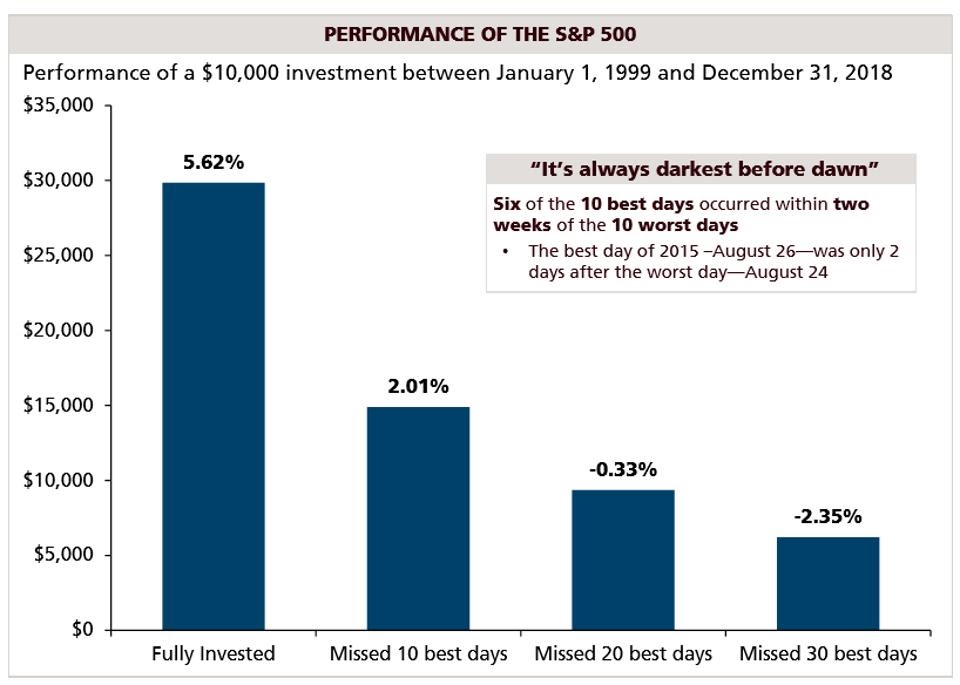The COVID-19 pandemic has affected nearly every part of everyday life with the notable exception of retirement accounts – that is, if you stayed the course. The S&P 500 continues to break fresh all-time highs, and stimulus checks have helped many people right-size their retirement accounts after years of underinvestment.
Let’s take a look at a few key pieces of advice to stop COVID-19 from derailing your retirement savings and income.
Learn more about retirement planning strategies on our Retirement Channel.
Stay the Course
There’s a large body of evidence showing that market timing is almost always a bad idea. For example, missing just a handful of strong performing days can have a significant negative impact on performance. The best-performing days also tend to come within weeks of the worst-performing days, which makes reactionary investing very dangerous.

The impact of missing just a few days. Source: JPMorgan
Fidelity Investments found that one-third of investors over 65 who made changes to their portfolio sold some of their stock holdings in February and March 2020. Across all age groups, nearly one-in-five investors who made changes to their portfolios sold some stock. Selling during a crisis results in both a bad price and, frequently, missed rebounds.
Since the market bottom in March 2020, the S&P 500 has soared by nearly 60% to the benchmark index’s current all-time highs. Those that sold stock in February and March missed out on the significant rally and, even worse, may still be sitting on the sidelines. On the other hand, those that rode out the volatility have realized significant gains in a short period of time.
Reevaluate Risk
Investors who are spooked enough to liquidate stock holdings in the event of a market downturn may want to reconsider their risk tolerance and asset allocation. After all, most financial advisors run through these kinds of scenarios when assessing a client’s risk tolerance, and if an actual downturn demonstrates risk aversions, it may be a more accurate assessment.
There are several ways to de-risk a portfolio:
- Low-vol strategies are a smart-beta strategy focused on minimizing portfolio volatility while still benefiting from the low costs of a passive strategy.
- Inflation-protected securities, such as TIPS, make it easy to hedge against inflation while
still benefiting from bond income.
- Diversification helps de-risk a portfolio by ensuring that it’s insulated against shock from any one asset class or region.
Investors may also want to take another look at their cash holdings to ensure that they have enough on hand to support them during an emergency. Most financial advisors recommend having between three to six months of living expenses set aside for an emergency – and with the market near all-time highs, it’s a good time to sell.
Be sure to check out our Portfolio Management Channel to learn more about different portfolio management techniques.
Shift Allocations
The challenge in today’s market environment is the risk of holding bonds. While bonds have historically been a safe-haven investment, ultra-low interest rates have made them a lot riskier in the eyes of Warren Buffett and other prominent voices. Meanwhile, the tendency to turn to riskier bonds, such as junk bonds, negates their safe-haven status of these investments.
There are several alternative sources of income to consider:
- Preferred stock is higher on the liquidation preference ladder than common stock, and often pays an attractive dividend yield.
- Convertible bonds are convertible into common stock, which means that their valuations are tied to more than just interest rates.
- Municipal bonds are government securities that enjoy certain tax advantages over corporate and federal bonds, making them more compelling options.
- Dividend stocks may be attractive options for retirement-age investors seeking income for their portfolios without the risk of holding bonds.
Use the Dividend Screener to find high-quality dividend stocks. You can even screen stocks with ratings above a certain threshold.
Investors may also want to consider diversifying their bond holdings across issuers and geographies. For example, a diverse set of developed market, emerging market and corporate bonds will have less risk than exclusively holding U.S. corporate bonds. Many mutual funds make this kind of diversification easy to achieve at a relatively low cost.
The Bottom Line
The COVID-19 crisis has had a significant impact on everyday life, but the stock market has been incredibly resilient thus far. When reacting to COVID-19, investors should ensure that they’re sticking with their long-term plans, revaluating their risk tolerance when necessary and intelligently shifting their asset allocations when they need more income.
Keep track of the latest news in our News section, where we regularly publish the latest around dividend investing.

